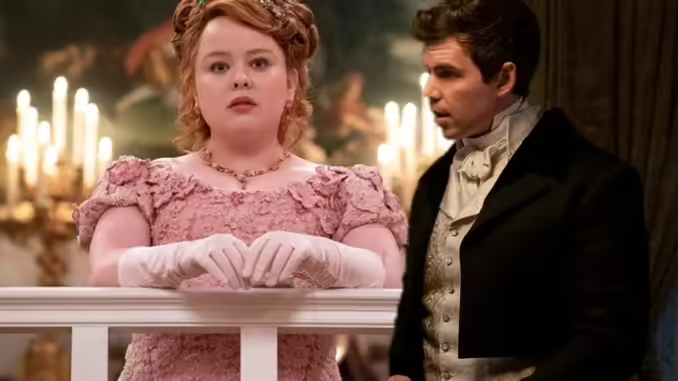
et us speak for a moment on the subject of split seasons. A painful subject for some, we know; “Bridgerton” gentlefolk, we’re peering at you. Sympathetically. Who among us hasn’t experienced the disappointment of being teased to the edge of delight only to be left blue by hiatus interruptus?
Such is the anguish of those who eagerly showed up to the ‘ton in May, hearts aflame to watch long-ignored Penelope Featherington (Nicola Coughlan) win Colin Bridgerton (Luke Newton) at long last.
At first Colin denied his stirrings for his old friend. But by the close of the fourth episode, our girl moved him to bare his emotion . . . and more. During a shared carriage ride, Luke led Penelope on a heart-racing detour up her skirt and into the digital underground. How else can one top that . . . save for a marriage proposal? Bliss! What came next?
A month-long wait. How cruel. I ask you, can the ends ever justify such wretched means? In a word: perhaps.
Split seasons aren’t novel among streaming services, and certainly not for Netflix. Previously, the streaming service presented divided seasons of “Stranger Things,” “You” and “The Witcher.” If you think that was annoying, prepare for the upcoming sixth season of “Cobra Kai,” scheduled to roll out in three parts.
Then there are the multiweek drops of some shows’ episodes, alongside other series premiering entire seasons at once. The upshot of all this is confusion and frustration among those of us ready to make a day of powering through our favorite shows only to discover we’re being served only half the episodes.
Why does this have to be so difficult?

There’s no single answer because the streaming landscape is constantly changing, along with a show’s popularity. But most of it comes down to a common concept: engagement. Streaming series live or die based on “views,” which Netflix measures by dividing the total time spent watching a movie or TV show’s season by their running time.
With new seasons of TV shows flooding an already crowded ecosystem, it’s increasingly challenging for any series that isn’t an established hit or supported by existing IP to break out from the rabble. Thus, there’s an elevated emphasis on keeping conversations about certain shows alive for as long as possible.
This is partly how Season 1 of “Bridgerton” became a phenomenon. Another major contributor to its astronomical popularity was the circumstances of its arrival. Not only did it drop on Christmas day, when little else offered competition, but during the 2020 holiday, the first of the pandemic.

